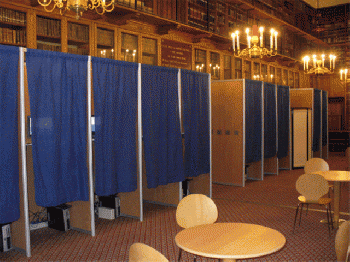
Voting booths
(Image by (From Wikimedia) Electiontechnology at Eng, Author: Electiontechnology at Eng) Details Source DMCA
"A cliche is haunting America -- the cliche of a second civil war," writes Jesse Walker in the Los Angeles Times. Pundits left and right wax ominous over the prospect of a permanent break in American society along partisan Republican/Democratic lines, citing outbreaks of street fighting a la Berkeley and Charlottesville.
But, as Walker points out, "[i]f you flip quickly between small violent clashes and big political disagreements, those big disagreements will look bloodier. But that's an optical illusion." The fighting at the extremes, and between wings of the mainstream political class, doesn't reflect the gooey, ever-shifting political center where most Americans live.
Elections are centrifuges which temporarily spin that center out into two halves (with a small remainder of third party voters), after which the people involved go back to living with each other in relative peace. Which is why, as Walker writes, "a near-future war with two clear sides and Gettysburg-sized casualty counts is about as likely as a war with the moon."
Another reason to doubt predictions of such clear-cut conflict is geography.
Even in America's last Civil War, the lines of demarcation weren't quite so clear as we like to see them in retrospect. The status of Missouri, Kentucky, eastern Tennessee and western Virginia vis a vis Union and Confederacy were very much up in the air through much of the war.
Today, the lines are even more blurry. "Red" states abut "blue" states and "purple" is a thing too. Purple Colorado is surrounded by a sea of red. The reliably Democratic west coast states are across the country from most of their partisan sister polities. "Live free or die" New Hampshire borders the effectively euro-socialist enclave of "Taxachusetts." We're too mixed up to break up.
So, if we can't get along and we can't separate, why not just abandon the notion of geographic state monopolies and let people choose the kinds of governance they want in situ at a more granular level?
It's called panarchy, defined by John Zube as "[t]he realization of as many different, autonomous and voluntary communities as are wanted by members for themselves, all coexisting non-territorially, side by side and intermingled ..."
Sound complicated? It really isn't. All any of us owes his neighbor is justice. Outside that general principle, there's no particular reason that you, me and the person across the street all need answer to the same rulers or get our "public" services from the same providers.
Would an interlocking framework of autonomous, voluntary, non-territorial communities give rise to novel difficulties? Sure. But there's no reason to believe those difficulties would be any worse than those we face now in our one-size-fits-all political system. And we'd be freer to find solutions.




